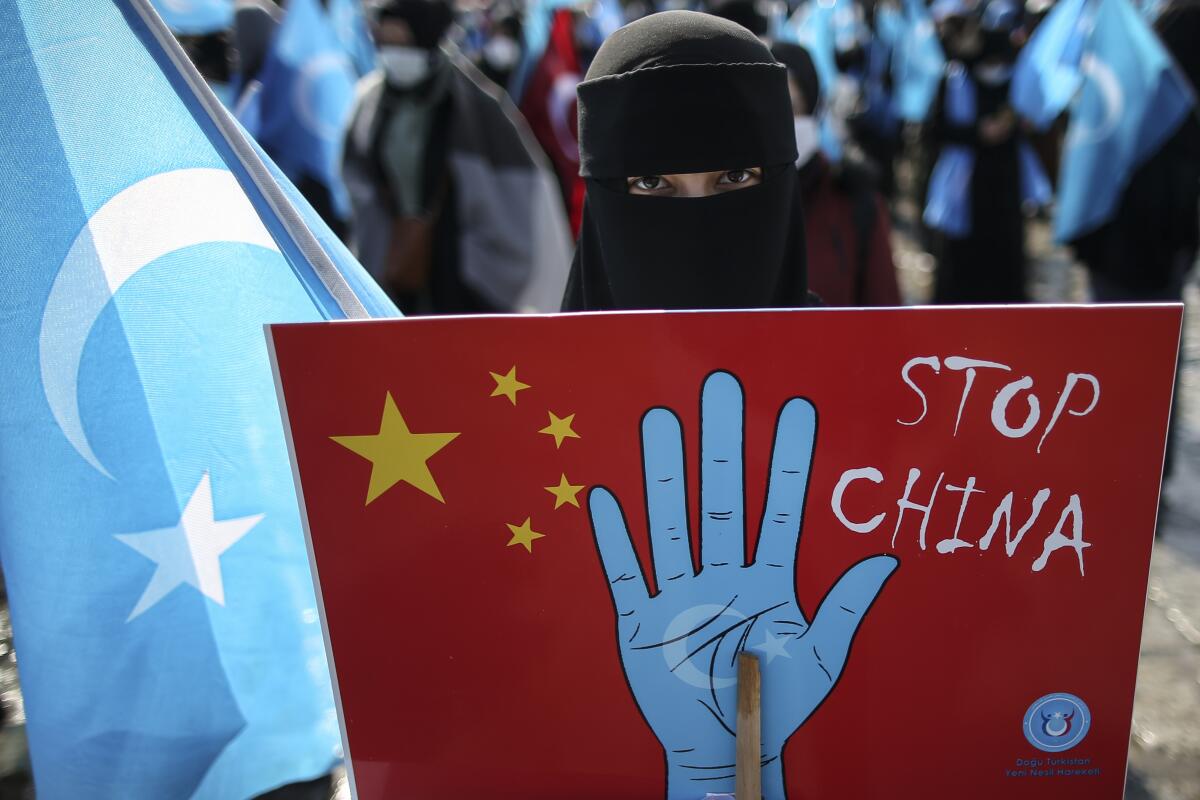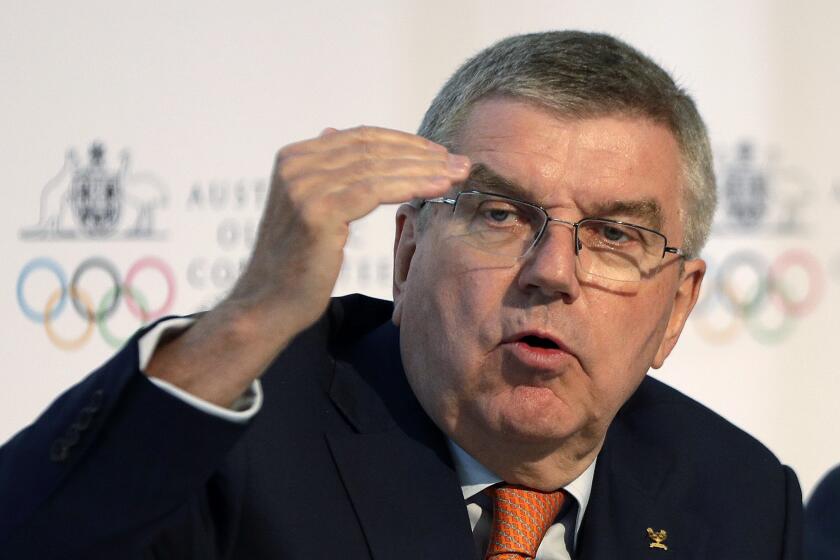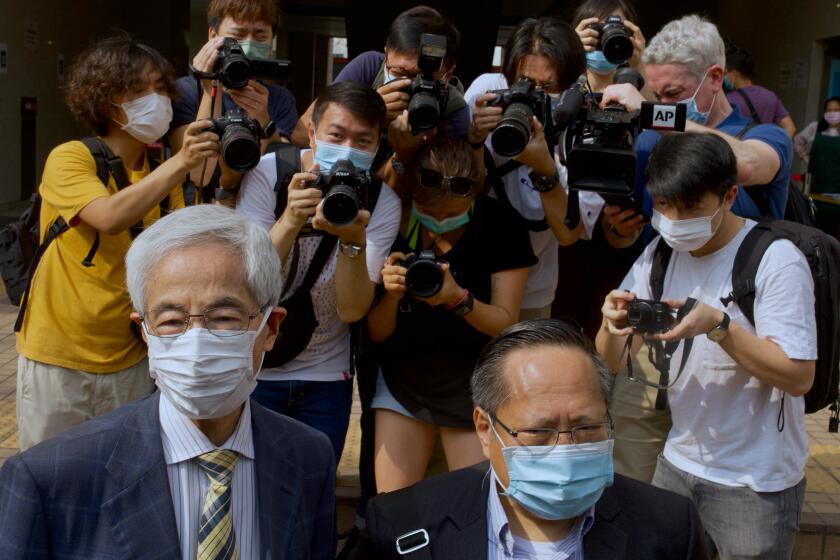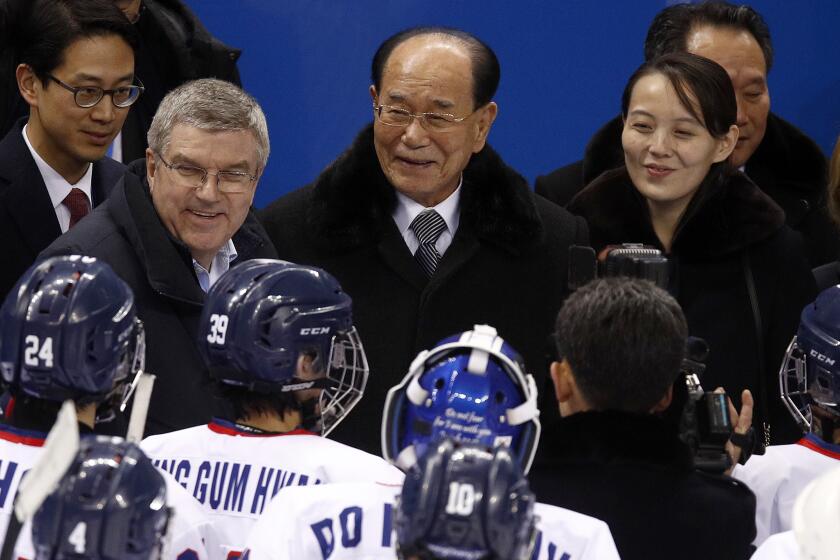Explainer: Boycotting the Beijing 2022 Winter Olympics and other options

- Share via
The U.S. State Department says it’s talking with allies about China’s human rights record and how to handle next year’s Beijing Winter Olympics.
A department spokesman on Tuesday suggested that an Olympic boycott to protest China’s rights abuses was among the possibilities. But a senior official said later that a boycott has not yet been discussed.
Human rights groups are protesting China’s hosting of the Games, which open Feb. 4, 2022. They have urged a diplomatic boycott or refusal to participate to call attention to alleged Chinese abuses against Uyghurs, Tibetans and residents of Hong Kong.
Activists are also reaching out to national Olympic committees, athletes and sponsors after failing to get the Switzerland-based International Olympic Committee to move the Games out of China.
Beijing is the first city to win the right to host both the Summer and Winter Olympics. The 2008 Summer Games were awarded to the Chinese capital with the hope of improving human rights in the country.
Position of IOC and China
International Olympic Committee President Thomas Bach says the IOC must stay out of politics, although it holds observer status at the United Nations and Bach has touted his own efforts to unite the two Koreas at the 2018 Winter Olympics in Pyeongchang, South Korea.
“We are not a super-world government where the IOC could solve or even address issues for which not the U.N. Security Council, no G-7, no G-20 has solutions,” Bach told a news conference last month. He has repeated that the IOC must stay “neutral.”
IOC President Thomas Bach worries about a possible boycott of the 2022 Winter Olympics because of China’s human rights record.
China says “political motives” underlie any boycott effort and has warned the U.S. against such a move.
“China firmly rejects the politicization of sports and opposes using human rights issues to interfere in other countries’ internal affairs,” Chinese Foreign Ministry spokesman Zhao Lijian said in March. He said an effort at a boycott “is doomed to failure.”
Activists have met with the IOC
Activists met late last year with the IOC and asked for the 2022 Olympics to be moved. They also asked to see documents that the IOC says it has in which China gave “assurances” about human rights conditions. Activists say the IOC has not produced the documents. The virtual meeting was headed by IOC member Juan Antonio Samaranch Jr., who oversees preparations for Beijing. His father was a longtime IOC president.
“We felt like the IOC were having a meeting with us, more so that they could say they were having a meeting with us rather than because they actually wanted to listen and act on anything that we had to say,” Gloria Montgomery, campaigns coordinator at the International Tibet Network, said in a recent briefing with other activists.
Seven pro-democracy advocates in Hong Kong have been convicted on charges of organizing and participating in massive anti-government protests in 2019.
Frances Hui, director at We the Hongkongers, suggested that there was a condescending tone from the IOC in the meeting.
“The first thing we heard is: ‘It’s a very complicated world.’ And I asked again: How are you going to legitimatize a Games that’s based in a country practicing genocide and murdering? Again the reply to me was, ‘It’s a complex world.’”
Boycott, diplomatic boycott
Activists are talking about softer forms of a boycott, but have not ruled out the kind of boycott led by the United States of the 1980 Moscow Olympics, from which 65 countries stayed away, including China, and 80 participated.
“I think a diplomatic boycott would be very much welcomed by all of our communities. We have been looking towards accountability, and that is definitely part of that path toward accountability,” said Zumretay Arkin, spokeswoman for the World Uyghur Congress.
“Of course the athletes, it’s unfair to them. But athletes also have a conscience, an opinion of their own,” she added.
What would a boycott accomplish?
Bach, who won a gold medal in fencing in the 1976 Games, was deprived of going to Moscow in 1980 as a member of the West German team. He opposes a boycott, which would also severely hurt the IOC’s finances and its image.
The IOC earns 91% of its revenue from selling broadcast rights and sponsorships and has seen its income stalled by the postponed Tokyo Summer Olympics, which are scheduled to take place in July.
The United States Olympic and Paralympic Committee has also questioned the effectiveness of boycotts.
North Korea is the first country to drop out of the Olympics in Japan because of coronavirus fears, the nation’s Sports Ministry announced.
But it’s one of the few leverage points activists have.
“Before we called for a boycott, we hoped that the IOC could strip China of hosting the Olympics, but they didn’t want to do that,” said Teng Biao, an exiled Chinese human rights lawyer and activist. “I think the Olympics is a thing the Beijing government cares very much about. We should not give up that chance.”
Teng also encouraged foreign athletes and other participants to protest if the Olympics take place — with social media posts, by wearing descriptive T-shirts or by skipping the opening ceremony.
“In terms of the people in Tibet, Uyghurs, Chinese people living in China, I don’t encourage them to protest because the Chinese government has been increasingly brutal. I don’t want them to take a risk to protest during the Olympics,” Teng said.
Several activists cautioned that even athletes and other participants from abroad could be arrested in China under a far-reaching national security law.
“When we call for a boycott, it has to be a coordinated boycott led by democratic countries who are now accepting that the genocide is happening,” said Dorjee Tseten, executive director at Students for a Free Tibet. “If we don’t stand now, it will be impossible to make China accountable.”
More to Read
Sign up for Essential California
The most important California stories and recommendations in your inbox every morning.
You may occasionally receive promotional content from the Los Angeles Times.













